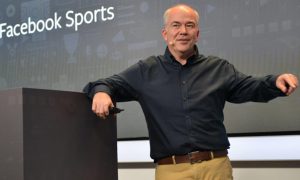Facebook’s Peter Hutton on bringing community and interaction to live sports broadcasting

SAid Peter Hutton: “I think it’s important when you talk about video on Facebook that we don’t see it purely in terms of consumption of minutes of content”
Facebook is now well known for its live sports broadcasting capability, yet as far as live sport is concerned the platform is enabling a far richer environment than just being another place to consume moving images.
SVG Europe spoke to Facebook’s director of sports partnerships, Peter Hutton, about the platform’s strategy regarding live sports, and where it is adding to the experience for fans and federations alike.
Hutton said: “I think it’s important when you talk about video on Facebook that we don’t see it purely in terms of consumption of minutes of content; it’s also where does that [content] take you, what additional information can a federation use and retarget, and build their business on the basis of those audiences?”
More than just broadcasting
Live sport on Facebook is about more than just the broadcast, notes Hutton. On ironman and surfing broadcasts, he said, “that’s something that seems to be working very well because you get that sense of a community coming together on Facebook to enjoy that content, and that’s something we’ll increasingly lead into; that idea of communities sharing a passion, sharing it every day, multiple times a day, with live content being part of that experience.”
The platform is proving to be advantageous for certain types of sports that are not necessarily suited to live broadcasts on linear TV, Hutton said. Facebook is working with ironman and surfing federations to publish live content. He commented: “Surfing, for example, you never know when it’s going to start; till the wave conditions are right, it might be Tuesday, it might be Wednesday? So [using a platform] where you can send out notifications [to the community] saying the event starts now and alert fans worldwide to watch it, is a step forward for that community. Ironman is a sport where you’ve got all day events that don’t really work on linear TV; it’s too much of a commitment in live hours. But there’s a passionate community all over the world that want to watch that content.
“The priority is improving the experience and that’s really at the heart of the experiments that we’re doing. We want to make this better for a fan”
“So there’s lots of existing sports that benefit from what we can offer and the ways you can consume that material, but it’s also about allowing the federations and teams and leagues to then build their businesses into what we offer,” he went on.
Continuing, Hutton said: “A lot of people will use their audiences to serve other business needs. Ironman looks at the people who watch [the live feeds on the platform] and say they’re the logical participants for other [ironman] events, so they retarget them with advertising and information to have them sign up for events. You look at some of the North American sports leagues and they particularly use those audiences of video as their ticket buyers; it’s a natural way of targeting people that want to buy individual or season tickets.
“The same is true of merchandising and Instagram shopping which is rising and rising in popularity,” he added. “Again, this is a way of hitting those audiences the content that they want.”
 Keeping up with moving targets
Keeping up with moving targets
On Facebook’s strategy for live sports broadcasting, whether that be live or on demand, Hutton said: “It’s a question that continues to be updated because we’re in the middle of a lot of trials of different types of content on the platform, across a lot of different markets.
“The majority of content on the platform is put on by publishers to solve their business needs and that’s great to see. Those publishers are looking to develop their audiences around the world, to be in a place where their audiences are, and that’s one of the great advantages of being part of the Facebook system. The number of hours people are publishing on the platform is increasing all the time, really without our direct involvement.”
Hutton continued: “The priority is improving the experience and that’s really at the heart of the experiments that we’re doing. We want to make this better for a fan. We don’t want that sense that somehow Facebook is taking something away from a fan; we’re all about being a free-to-air funnel that people can come and enjoy and experience in a way that’s hopefully better than the way they’ve experienced that sport before. And that might simply be about ability, it might be about different layers of information and data they can take at the same time as they’re watching events, and it might be that they’re chatting with their friends and discussing the event while it’s going on. So our focus is how can we make the experience of watching live better on Facebook, in terms of in the moment and how do you build on that live watching experience.”
Bring the baggage!
For the company and also personally, Hutton is facing challenges in the industry. He says part of it is, “the baggage that I bring to this, right!”. He explains that in his previous roles, sports rights sales were the key to all problems, whereas at Facebook, it is more complex. “I’ve had 30 years of working in pay TV, trading rights and basically building pay TV audiences, and therefore the conversations I’m having with a lot of old friends across the table [now I’m at Facebook] are starting to become very different.

“We are going to help solve problems your business faces, but it’s not saved straightforwardly with one cheque for rights”
“I think it’s important that we change that agenda, and say, look, we are going to help solve problems your business faces, but it’s not saved straightforwardly with one cheque [for rights],” he continues. “It’s about building anti piracy solutions, it’s about building a lasting community, and [that means] taking people away from reliance on one TV rights cheque, but building other elements of their business as well. That’s definitely part of the challenge.”
He went on: “The other challenge that any video streaming platform will tell you is that reliability and the quality of the feed is a permanent challenge; it’s not going to go away. We permanently have to push the standards higher and make the experience better. Whether that be a broadcaster’s over the top (OTT) platform or ourselves, that challenge is constant because people rightly have a desire for high quality, secure feeds that won’t buffer, that can give a constant viewing experience, and that’s a constant battle that we face every day.”
Hutton is energised by the quality of people working around him at Facebook. He notes: ““The great thing about Facebook, genuinely, is that I work for the engineers now, as opposed to my previous world where it was the other way around. We have some incredible minds in this place, and just the quality of conversation and the ability to look forward to get a sense of what the next technology challenges will be is really educational. You really have your eyes opened [here] in terms of what’s next and where we are heading towards.”
2020 is set to be an interesting year for Hutton, and Facebook’s live sports mission. Hutton commented: “We’re in a time of really rapid consumer change and consumer consumption change, and as a result I know we’ll have learned a lot by the end of the year that we didn’t know at the beginning of the year, in terms of where content is going, where the rights market is going, and how we can improve that experience.
“I certainly hope that the live experience by the end of 2020 will be much better than it is now, and I look forward to more and more publishers coming on the platform to solve their various business challenges, by putting more and more content across Facebook, Instagram and on Oculus, our virtual reality (VR) service. I think you’ll see more of those different journeys, more content in VR and more augmented reality (AR) effects around sports events,” he concluded.
Hutton is a keynote speaker at SVG US event, SVG Summit, 16-17 December 2019, New York. Click here to find out more.
